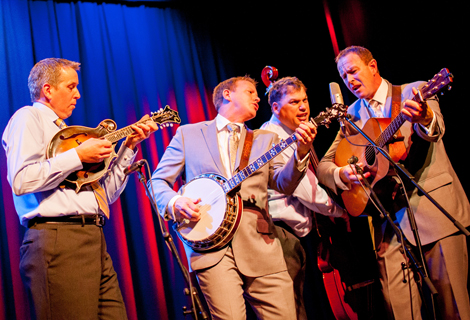
Reflections on Vancouver, British Columbia and other topics, related or not
‘Living the dream’
Country and eastern comes to the coast
Greg Klein | September 3, 2016
A Spinney Brothers promo photo.
I managed to catch just a few hours of the Chemainus Bluegrass Festival in July but was lucky enough to hear the Spinney Brothers. A mix of bluegrass and traditional country, these guys feature sharp playing (banjo, mandolin, guitar and bass) along with really good lead and harmony vocals. Their repertoire includes classics like Foggy Mountain Breakdown, a medley of Wilf Carter-style yodelling mixed with Muleskinner Blues, and their own material, some of it leaning strongly to the humorously cornpone persuasion.
That’s helped unintentionally by the way one Spinney sometimes scrunches up his face to deliver a lyric with Man of Constant Sorrow angst. Still, I Want My Dog Back deserves to be a hit.
These Nova Scotians bring to mind the question of why country took root so firmly in the Atlantic provinces and Ontario, so much more than other regions. Canada’s supposed cowboy country, for example, spawned kd lang and Jerusalem Ridge, but they don’t reflect any local traditions (unless lang’s earlier recordings showed some Prairie influences).
Down East, some surviving semblance of folk traditions must have helped. Then there’s the early stardom achieved by Carter and Hank Snow, a series of later commercial successes and the enduring example of people like Don Messer.
Snow sang about the U.S. much more than Canada. Carter somehow became known as Montana Slim. Maybe they thought their Americanization necessary for success. Or maybe they suffered from that common Canadian affliction of American Wannabeism. Messer and his show, on the other hand, created a uniquely Canadian institution.
A mix of Atlantic folk influences, traditional and popular country, and old time pop played by a sometimes unusual line-up of musicians, Messer’s TV show had no parallel I know of. It caught on right across Canada, seemingly with a generation that grew old with the musicians.
Naturally the CBC, supposedly our guardian of national culture, abruptly cancelled the show in 1969, during a time of high national consciousness. Don Messer’s Jubilee lasted in syndication four more seasons until he died. He had to have been a long-lasting influence on the East Coast.
Ontario, much to the surprise of some Westerners, had and maybe still has Canada’s most extensive circuit of country and western bars and clubs. They featured home-grown acts with their own songs and strong followings, as well as no end of cover bands. Tommy Hunter was among Ontario C&W’s biggest and certainly longest-lasting stars, although Gordon Lightfoot performed some country material too. Sundown should be considered a country classic—and if Nashville stalwarts disagree, that might be because the song rises far above Nashville cliché-dom. (Same goes for some of lang’s material. Of course the Albertan dike with a beef against beef hardly fits any Nashville-approved persona.) So to hell with any American delusion that they own this music.
The Ontario circuit also hosted East Coast musicians who could fill those huge hotel taverns through word-of-mouth. The local contingent of the Atlantic diaspora would be out in force, to the delight of bar owners. Easterners drink.
It might have been the opportunities presented by the Ontario scene that prompted Michelle Wright to brand herself a country singer. She used to—maybe still does—tell audiences her real love remained “roots music,” by which she meant ’60s soul. She’d then go on to slaughter a succession of Aretha Franklin songs with utterly inane caterwauling.
Few musicians dare try to cover or re-interpret the material of R&B’s secular trinity: Franklin, James Brown and Ray Charles. (One outstanding exception is Mongo Santamaria’s version of Cold Sweat, with Hubert Law’s tenor taking Brown’s place and Bernard Purdie elaborating on his famous drum solo in the original. John Scofield’s tribute to Charles has its moments too.)
Back to the Spinneys, they call their latest CD Living the Dream, which they say they’re doing by playing their music. They’re also, pardon the blues cliché, paying their dues. To get from one gig to another they sometimes drive 18 hours at a stretch, the four of them cooped up in a minivan. That’s hardly everyone’s idea of a dream, but these are real musicians and they’re determined to play.
No doubt they’d like more comfortable travel and bigger audiences than the disappointing Chemainus turnout. But short of that, they give every impression there’s nothing else they’d prefer to be doing.
